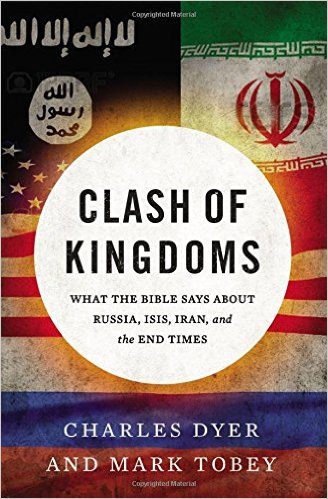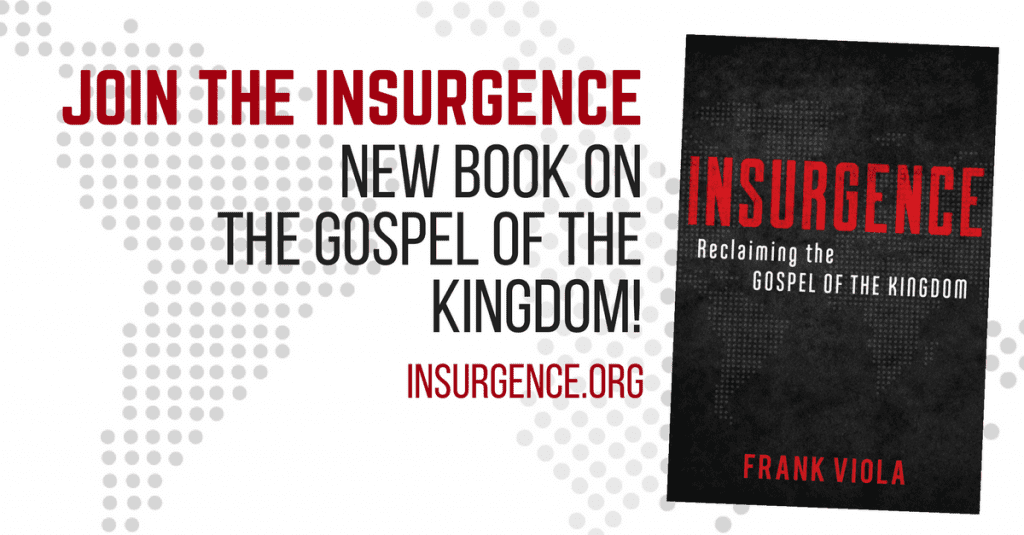Clash of Kingdoms: What the Bible Says about Russia, ISIS, Iran, and the End Times by Charles Dyer and Mark Tobey is a new book by Thomas Nelson (my publisher).
I caught up with the authors recently to ask them about their book.
Enjoy!
Instead of asking, “what is your book about,” I’m going to ask the question that’s behind that question. And that unspoken question is, “how are readers going to benefit from reading your book?”
Charlie: Readers will gain an understanding of how seemingly disconnected current events really fit a pattern predicted in God’s Word. And by gaining insight into God’s plan for the future they will be able to remain calm amid all the apparent chaos of our world.
Mark Tobey: We’d love for readers to keep this book right next to their television remote as a guide while they’re watching the latest news report. It’s that handy, honestly. With all the confusing messaging flowing from the airwaves and across the Internet, we felt Christians especially needed a guide to help sort it all out and put everything in a Biblical context.
What motivated you to write this book?
Charlie: We saw the impact The ISIS Crisis had in helping people respond to ISIS in a biblically appropriate way. In that book we said there was a greater threat than ISIS just over the horizon. We were referring to Russia, and we wanted to “complete the prophetic picture” by explaining in more detail the role Russia, Iran, and other countries will play in God’s end-time drama.
Mark Tobey: Charlie and I share a passion for equipping people with Biblical truth and perspective. Let’s face it: Anyone can hop on the Internet and Google prophecy and current events and get a zillion options, many of which end up being completely unreliable and even far-fetched. We wanted to provide a reliable, calm, but compelling book that points readers to the truth of God’s Word.
What is God’s kingdom, in your view, and how does it differ from the kingdoms of this world, including those of Russia, ISIS, and Iran?
Charlie: Jesus said God’s kingdom was not of this world (John 18:36). He also told His disciples to pray, “Your kingdom come, Your will be done on earth as it is in heaven” (Matthew 6:10). God’s kingdom refers to His rule, and someday that absolute rule will be exercised directly here on earth. That will happen when Jesus, the King of kings, returns to take His rightful place on the throne of David. God instituted human government, but the kingdoms of this world differ from God’s kingdom in the sense that they are controlled by flawed individuals. Lord Acton said “Power tends to corrupt and absolute power corrupts absolutely.” Earthly kingdoms exhibit, to a greater or lesser degree, that tendency toward corruption, which will be totally absent in God’s earthly kingdom.
Mark Tobey: Everything Charlie said! I’d only add that the Bible teaches us that the battles we face on a personal level as Christians, such as temptations, the breakdown of values and human relationships, even confidence in our identities in Christ, is a battle that is primarily, if not, wholly, “unseen.” In Ephesians 6, Paul declares that our battle is not against flesh and blood, but against “evil rulers and authorities of the unseen world, against mighty powers in this dark world, and against evil spirits in the heavenly places” (Ephesians 6:12, NLT). Those are kingdoms words. And it’s an unseen, but formidable kingdom.
Tell us what the Bible says about Russia in your view and what you see how it relates to the end time.
Charlie: The Bible doesn’t identify Russia by name. But in Ezekiel 38–39 God predicted a powerful leader would arise from the region north and east of the Black Sea who would lead a coalition of nations against Israel. The coalition includes Persia (modern Iran) and the area now occupied by Turkey. This invasion will be one of the first in a series of conflicts that are part of God’s end-time program culminating in the return of Jesus to earth.
Mark Tobey: These grand prophetic oracles, namely in Ezekiel and Daniel, signal a strong and prevailing power that will ultimately bring the enemies of Israel together in a singular effort to destroy. These current movements and alliances being forged between modern Russia and Iran and others seems to point to Russia playing a key role in the commencement of these major end times sequences.
Tell us what the Bible says about Iran in your view and what you see how it relates to the end time.
Charlie: Iran is identified as “Persia” in Ezekiel 38. Iran’s role in the end times might be described as a “walk-on part” in God’s final drama. That is, Iran only plays a supporting role by joining the coalition coming to attack and destroy Israel. God will directly intervene to stop that attack and to destroy the invaders. Iran’s present hatred for Israel and growing relationship with Russia closely match the relationship God said will develop as the end times approach.
Mark Tobey: The Bible is plain, in so many places: God declares that any nation that “curses Israel, He will curse” (Genesis 12). Just rewind any recent tape of any number of Iran’s representatives regularly “curse” Israel and restate in no uncertain terms to wipe this blessed nation from the face of the earth.
Tell us what the Bible says about ISIS in your view and what you see how it relates to the end time.
Charlie: I’ve always tried to be clear in saying ISIS is not predicted in the Bible. The future Antichrist is not Islamic, and ISIS doesn’t fulfill Bible prophecy. Rather, ISIS is the product of Sunni Islamic fundamentalism that sprouted from the soil of Sunni/Shiite animosity and Western colonialism at the end of World War I. However, God has been using ISIS to help reshape the boundaries, contours, and alliances in the Middle East and Europe. And in that sense ISIS has played a role in setting the stage for God’s end-time drama.
Mark Tobey: Charlie’s right, of course, ISIS does not appear specifically in the Scriptures, but the evil that the organization represents and continues to franchise around the world absolutely does: Revelation 16 points to a period on earth when “the demonic spirits” will gather “all the rulers and their armies to a place with the Hebrew name Armageddon” (Revelation 16:16). Though we are not in that period today—Christ will appear and receive the Church prior to all of that unfolding—you see the epitome of evil in the heinous and relentless deeds of ISIS and the setting of the stage for an unleashing of violent age unlike the world has ever seen.
It is beyond dispute that the average person who is involved in an Islamic terrorist organization is more radical, more devoted, and more absolute to their cause and god than most Christians are to the truth of Jesus Christ. Why do you think this is? Specifically, what’s motivating those who are more devoted to a false belief than those who are following the truth?
Charlie: I believe this is only true when we compare Western Christians with Islamic fundamentalists. Christians in the West are often spiritually weak because of our culture’s prosperity and materialism. Like the church of Laodicea we can be tempted to say, “I am rich; I have acquired wealth and do not need a thing” (Revelation 3:17).
In contrast, many Christians in the Middle East continue to experience persecution. And in their response to that persecution they have demonstrated an amazing devotion to Jesus, even to the point of being martyred for their faith. Islamic fundamentalists are motivated to jihad because death as a martyr is the only way they can assure themselves of entry into Paradise. Islamic martyrs die taking the lives of others; Christian martyrs die giving their lives for Jesus and others. That’s the fundamental difference.
Mark Tobey: I also feel such radical elements are under the spell, power actually of Satan himself (Ephesians 2:2). And they have been deceived by what the apostle Paul described as a “doctrine of demons” (1 Timothy 4:1).
What do you hope readers will walk away with after they finish your book?
Charlie: This depends, in part, on the spiritual condition of the reader. I hope that someone who is a follower of Jesus will walk away with a greater sense of confidence and trust in God’s control of the world. I also hope they develop a greater sense of purpose to use whatever time remains to make an impact for Jesus on the world. For readers who are not yet followers of Jesus, I hope they walk away realizing that God not only has a plan for the world, He also has a plan for them—and it involves their need to place their trust in Jesus as Lord and Savior.
Mark Tobey: Hope. That’s what we all need, but especially the reader who is wringing her hands and living in fear of what is swirling around us every day.
What else would you like to say about the book?
Charlie: The Middle East is complex, but we have written a book that is clear and understandable. If you want to understand the Middle East and Bible prophecy, this book will give you that insight.
Mark Tobey: I strongly feel churches everywhere need this book. We’ve designed for the single reader, but also to be used in a small group, Bible study context. Everything is available on clashofkingdomsbook.com. This topic is NOT going away and pastors and ministry leaders would do well to take full advantage of the uncertainty and desire the people in their congregations have for information and Biblical perspective to point them in a fresh and compelling way to the Bible for all those things. We live in uncertain times, yes. But also exciting times for the Gospel and for the Church.














